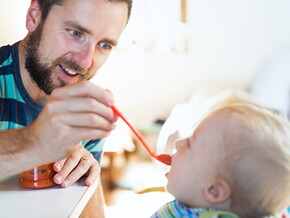
During your baby's early months, her sleep habits may have been unpredictable, with the possibility of several wakings during the night. Now that your healthy baby is six months old, she is able to sleep for longer stretches at night. As her daytime activity increases, and her development progresses, she may start to develop regular sleep cycles.
Consistency is everything when it comes to bedtimes and sleeping routines. Following a similar pattern before lights out will help your little one get sufficient sleep.
Amazingly, recent research has also shown that babies and young children who regularly don’t get enough sleep are more likely to grow up to be children with lower-quality diets. In one particular study, children who had adequate sleep (from infancy to mid-childhood) ate more servings of whole grains and drank fewer sugary drinks. With the link between a long-term lack of sleep and a tendency toward less healthy nutrition, there is even more reason to make sure that your baby is getting enough sleep on a regular basis.
It’s not a good idea to wait until your baby is fast asleep before putting her down in her crib. Babies who are placed in their cribs when drowsy, but still awake, are thought to be more likely to learn to fall asleep on their own. Of course this may not happen the first time, or every bedtime, but it is worth now exploring an approach to encourage your little one to figure out how to settle herself. Moms who have followed these sleep practices for the past few months will likely be seeing the benefits by now, with their little one settling to sleep on her own at night. If this is a new practice for you and your baby, the time is still right for you to help your baby get a good night’s rest. See 13 tips for sweet dreams for some guidance.
Sleep and growth
Experts agree that adequate sleep is linked to healthy growth. Behind your baby’s closed eyelids, her body is busy developing—physically, mentally, and emotionally.
In one recent scientific study, the sleeping patterns of two groups of babies were compared up to the age of one year. Parents of babies in one group received basic instructions on sleep and crib safety, but not on ‘responsive parenting’ techniques. Parents in the second group were taught responsive parenting techniques related to sleep, including:
• using soothing approaches to calm a fussy, but non-hungry baby, rather than feeding
• recognizing if fussiness was because of hunger or tiredness
• following consistent bedtime routines that didn’t finish with feeding to sleep
• practicing early bedtimes
• allowing their babies some limited time to self-soothe when put down for the night and when waking during the night
The study showed that babies whose parents followed responsive parenting techniques for sleep were more likely to:
• have earlier bedtimes
• self-soothe themselves to sleep
• sleep longer at night
“This study shows the positive impact that parent actions can have on their baby’s sleep,” explains Anne Dattilo, PhD, RD, Associate Director of Nutrition Science at Nestlé Infant Nutrition. “When parents followed responsive parenting techniques, the babies showed improvements in their sleep patterns and nightly sleep duration. As additional research has shown a link between young child’s sleep and a healthy growth curve, parents can be encouraged to recognize that sleep routines they establish for their baby now, can have lasting health effects.”
A fussy baby isn’t always a hungry baby
If your baby wakes in the night, it’s easy to assume she must be hungry. However, this is not always the case. Babies wake in the night for various reasons—she may be generally unsettled, have a dirty diaper, or have been woken by a loud noise. Or, as she gets closer to seven or eight months, she may be experiencing separation anxiety. This is normal, and she may just need to know that you are there for her.
Some parents believe formula-fed babies are more likely to “sleep through” the night, but research suggests that they wake just as often as breastfed babies. Studies show that moms who use food to soothe their babies, when they aren’t showing signs of hunger, have heavier children. Dr. Dattilo reiterates that “choosing nighttime and daily nap-time soothing methods that do not include feeding, when your baby is not showing signs of hunger, can help reduce the risk of your baby growing up to be overweight.”
Sources
Brown A, Harries V. Infant sleep and night feeding patterns during later infancy: association with breastfeeding frequency, daytime complementary food intake, and infant weight. Breastfeed Med 2015; 10(5):246-52.
Cespedes EM, Hu FB, Redline S et al. Chronic insufficient sleep and diet quality: Contributors to childhood obesity. Obesity (Silver Spring) 2016; 24(1): 184-90. doi:10.1002/oby.21196.
Mindell JA, Li AM, Sadeh A et al. Bedtime routines for young children: a dose-dependent association with sleep outcomes. Sleep 2015; 38(5):717-22.
Paul IM, Savage JS, Anzman-Frasca S et al. INSIGHT responsive parenting intervention and infant sleep. Pediatrics 2016; 138(1): e20160762.
Sadeh A, Mindell JA, Luedtke K et al. Sleep and sleep ecology in the first 3 years: a web-based study. J Sleep Res 2009; 18(1):60-73.
Savage JS, Birch LL, Marini M et al. Effect of the INSIGHT responsive parenting intervention on rapid weight gain and overweight status at age 1 year: A randomized clinical trial. JAMA Pediatr 2016; 170(8):742-9. doi:10.1001/jamapediatrics.2016.0445.
Stifter CA, Anzman-Frasca S, Birch LL et al. Parent use of food to soothe infant/toddler distress and child weight status. An exploratory study. Appetite 2011; 57(3):693-9.


















